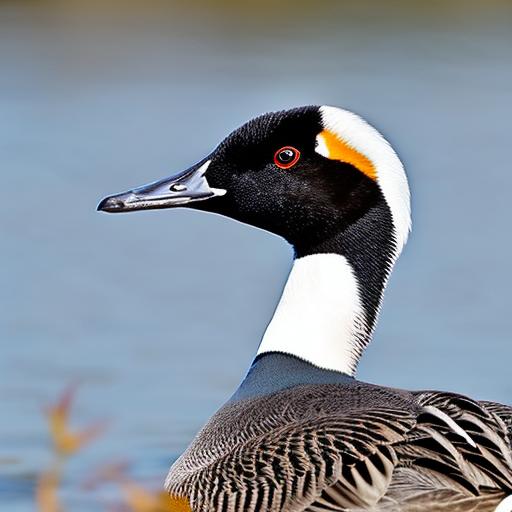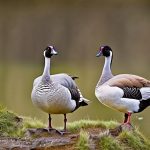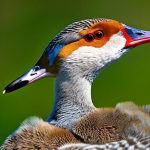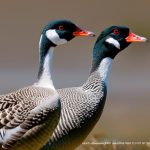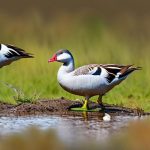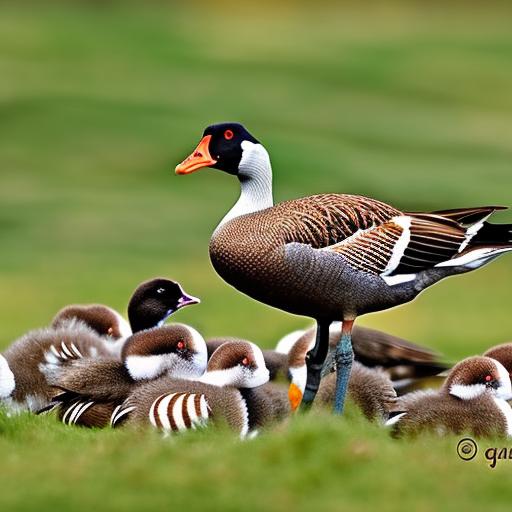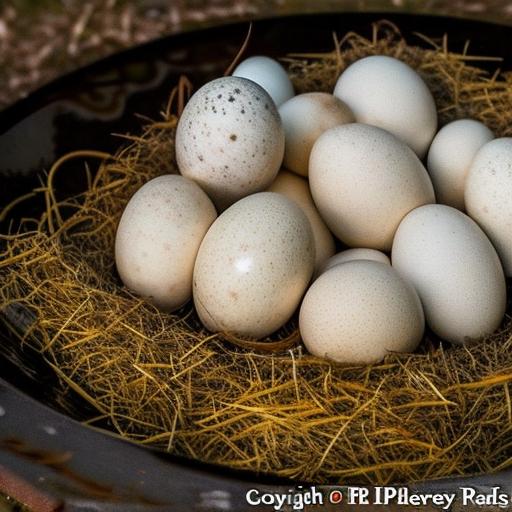Canada Geese are a familiar sight in Southern Quebec, where they breed and raise their young during the spring and summer months. These majestic birds are known for their distinctive honking calls and V-shaped flight formations, and they play a vital role in the region’s ecosystem. Canada Geese are monogamous and form strong pair bonds, often returning to the same breeding grounds year after year. They build their nests in a variety of habitats, including wetlands, grasslands, and agricultural fields, and are known for their aggressive defense of their nesting sites.
The breeding season for Canada Geese typically begins in late March or early April, when the birds return to their breeding grounds after wintering in the southern United States. The females lay a clutch of 4-7 eggs, which they incubate for about a month before the chicks hatch. Once the chicks are born, both parents take turns caring for them and teaching them how to forage for food. Canada Geese are highly adaptable and can thrive in a wide range of habitats, making them a common sight in urban parks, golf courses, and other human-altered landscapes.
Environmental Factors Affecting Canada Geese Breeding
Several environmental factors can influence the breeding success of Canada Geese in Southern Quebec. One of the most important factors is the availability of suitable nesting sites. Canada Geese prefer to build their nests near water, where they can easily access food and escape from predators. Wetlands and marshes are ideal nesting habitats for Canada Geese, as they provide ample food resources and protection from predators. However, these habitats are increasingly threatened by human development and habitat loss, which can limit the availability of suitable nesting sites for Canada Geese.
Another important environmental factor affecting Canada Geese breeding is the availability of food resources. During the breeding season, Canada Geese require a diet rich in protein and nutrients to support their reproductive efforts. They feed on a variety of plant materials, including grasses, sedges, and aquatic vegetation, as well as insects and small invertebrates. Changes in land use and agricultural practices can impact the availability of these food resources, potentially affecting the breeding success of Canada Geese. Additionally, severe weather events such as droughts or floods can also impact food availability for Canada Geese, making it more difficult for them to successfully raise their young.
Human Impact on Canada Geese Breeding in Southern Quebec
Human activities can have a significant impact on the breeding success of Canada Geese in Southern Quebec. One of the most significant impacts is habitat loss and degradation due to urbanization and agricultural development. Wetlands and grasslands, which are important nesting habitats for Canada Geese, are increasingly being converted to residential and commercial developments or agricultural fields. This loss of habitat can limit the availability of suitable nesting sites for Canada Geese and increase competition for remaining habitat.
Another human impact on Canada Geese breeding is disturbance from recreational activities. Canada Geese are often found in urban and suburban areas, where they may be exposed to disturbances from people walking, biking, or boating near their nesting sites. This disturbance can cause Canada Geese to abandon their nests or reduce their reproductive success. Additionally, human activities such as mowing and landscaping can destroy Canada Goose nests and eggs, further impacting their breeding success.
Predation and Nesting Success of Canada Geese
Predation is a significant factor affecting the nesting success of Canada Geese in Southern Quebec. Nest predation by mammals such as raccoons, foxes, and skunks is a common cause of nest failure for Canada Geese. These predators are adept at finding and raiding goose nests, often consuming the eggs or killing the young chicks. In some cases, predation pressure can be so high that it significantly reduces the overall nesting success of Canada Geese in a given area.
In addition to mammalian predators, Canada Geese also face predation pressure from avian predators such as crows, gulls, and birds of prey. These predators may target both eggs and young chicks, posing a significant threat to the reproductive success of Canada Geese. Predation can have a cascading effect on the population dynamics of Canada Geese, as it can reduce the number of young birds that survive to adulthood and contribute to the breeding population.
Importance of Habitat Management for Canada Geese Breeding
Habitat management plays a crucial role in supporting the breeding success of Canada Geese in Southern Quebec. By creating and maintaining suitable nesting habitats for Canada Geese, land managers can help ensure that these birds have the resources they need to successfully raise their young. This may involve restoring wetlands and grasslands, protecting natural areas from development, and implementing conservation practices on agricultural lands.
One important aspect of habitat management for Canada Geese is controlling vegetation growth around nesting sites. Canada Geese prefer to build their nests in areas with tall grasses or shrubs that provide cover from predators. By managing vegetation growth through mowing or controlled burns, land managers can create suitable nesting habitat for Canada Geese and reduce the risk of nest predation.
Climate Change and its Influence on Canada Geese Breeding
Climate change is expected to have significant impacts on the breeding ecology of Canada Geese in Southern Quebec. As temperatures continue to rise, changes in precipitation patterns and extreme weather events may impact the availability of suitable nesting habitats for Canada Geese. Wetlands and marshes may become drier or more prone to flooding, reducing the availability of suitable nesting sites for Canada Geese.
Additionally, changes in temperature and precipitation patterns may impact the availability of food resources for Canada Geese during the breeding season. Changes in plant phenology and insect abundance may affect the timing and quality of food resources available to Canada Geese, potentially impacting their reproductive success. Climate change may also alter the timing of migration for Canada Geese, affecting their arrival and departure from breeding grounds in Southern Quebec.
Implications for Conservation and Management of Canada Geese in Southern Quebec
The conservation and management of Canada Geese in Southern Quebec is essential for maintaining healthy populations of these iconic birds. Efforts to protect and restore wetlands, grasslands, and other important nesting habitats are critical for supporting the breeding success of Canada Geese. This may involve implementing conservation programs on public and private lands, as well as working with agricultural producers to implement wildlife-friendly practices that benefit Canada Geese.
In addition to habitat management, efforts to reduce human disturbance and predation pressure on Canada Geese nesting sites are also important for supporting their breeding success. This may involve implementing regulations to limit human activities near nesting sites, as well as controlling predator populations through trapping or other management techniques.
Overall, a multi-faceted approach that addresses habitat management, human impacts, predation pressure, and climate change is essential for conserving and managing Canada Geese in Southern Quebec. By working together to address these challenges, we can ensure that future generations will continue to enjoy the sight of these magnificent birds breeding in our region.
Meet Walter, the feathered-friend fanatic of Florida! Nestled in the sunshine state, Walter struts through life with his feathered companions, clucking his way to happiness. With a coop that’s fancier than a five-star hotel, he’s the Don Juan of the chicken world. When he’s not teaching his hens to do the cha-cha, you’ll find him in a heated debate with his prized rooster, Sir Clucks-a-Lot. Walter’s poultry passion is no yolk; he’s the sunny-side-up guy you never knew you needed in your flock of friends!

